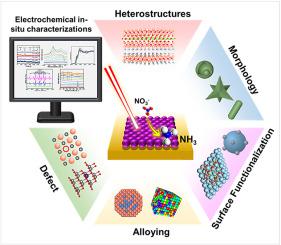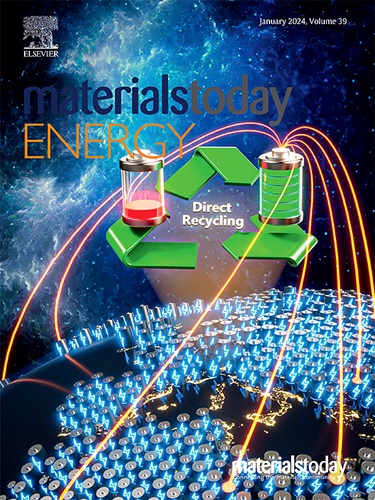Nitrate electroreduction: recent development in mechanistic understanding and electrocatalyst design
IF 8.6
2区 材料科学
Q1 CHEMISTRY, PHYSICAL
引用次数: 0
Abstract
Ammonia, with its wide-ranging applications in global industries, plays an indispensable role in the growth and sustainability of modern society. Electrochemical nitrate reduction (eNORR) presents an environmentally friendly pathway for ammonia production, sidestepping the energy consumption and greenhouse gas emissions associated with the conventional Haber–Bosch process. However, developing efficient and selective catalysts for eNORR is challenging due to its intricate multiproton-coupled electron transfer process and the competing hydrogen evolution reaction. This review dives deep into the recent advancements in eNORR, shedding light on the mechanism through spectroscopic studies and innovative strategies for catalyst design. We first lay out the possible reaction pathways and products in eNORR and then introduce a variety of electrochemical characterizations that provide real-time insights into the reaction mechanism. We also explore strategies for rational electrocatalyst design to optimize the performance. Representative examples of advanced materials with high activity, selectivity, and stability are highlighted to underscore the progress made in this field. Finally, we outline emerging opportunities and future directions, such as developing multifunctional nanostructured catalysts through integrated computational and combinatorial approaches. This review aims to provide valuable insights and guidance for developing nitrate electroreduction and the efficient production of green ammonia in industry.

硝酸盐电还原:机理认识和电催化剂设计的最新进展
氨在全球工业中有着广泛的应用,在现代社会的发展和可持续发展中发挥着不可或缺的作用。电化学硝酸盐还原法(eNORR)是一种环境友好型合成氨生产工艺,避免了传统哈伯-博施工艺的能源消耗和温室气体排放。然而,由于 eNORR 复杂的多质子耦合电子传递过程和相互竞争的氢进化反应,开发高效和选择性催化剂具有挑战性。本综述将深入探讨 eNORR 的最新进展,通过光谱研究和催化剂设计的创新策略揭示其机理。我们首先阐述了 eNORR 中可能的反应途径和产物,然后介绍了各种电化学特性,以便实时了解反应机理。我们还探讨了合理设计电催化剂以优化性能的策略。我们重点介绍了具有高活性、高选择性和高稳定性的先进材料的代表性实例,以强调该领域所取得的进展。最后,我们概述了新出现的机遇和未来发展方向,例如通过综合计算和组合方法开发多功能纳米结构催化剂。本综述旨在为开发硝酸盐电还原和在工业中高效生产绿色氨提供有价值的见解和指导。
本文章由计算机程序翻译,如有差异,请以英文原文为准。
求助全文
约1分钟内获得全文
求助全文
来源期刊

Materials Today Energy
Materials Science-Materials Science (miscellaneous)
CiteScore
15.10
自引率
7.50%
发文量
291
审稿时长
15 days
期刊介绍:
Materials Today Energy is a multi-disciplinary, rapid-publication journal focused on all aspects of materials for energy.
Materials Today Energy provides a forum for the discussion of high quality research that is helping define the inclusive, growing field of energy materials.
Part of the Materials Today family, Materials Today Energy offers authors rigorous peer review, rapid decisions, and high visibility. The editors welcome comprehensive articles, short communications and reviews on both theoretical and experimental work in relation to energy harvesting, conversion, storage and distribution, on topics including but not limited to:
-Solar energy conversion
-Hydrogen generation
-Photocatalysis
-Thermoelectric materials and devices
-Materials for nuclear energy applications
-Materials for Energy Storage
-Environment protection
-Sustainable and green materials
 求助内容:
求助内容: 应助结果提醒方式:
应助结果提醒方式:


